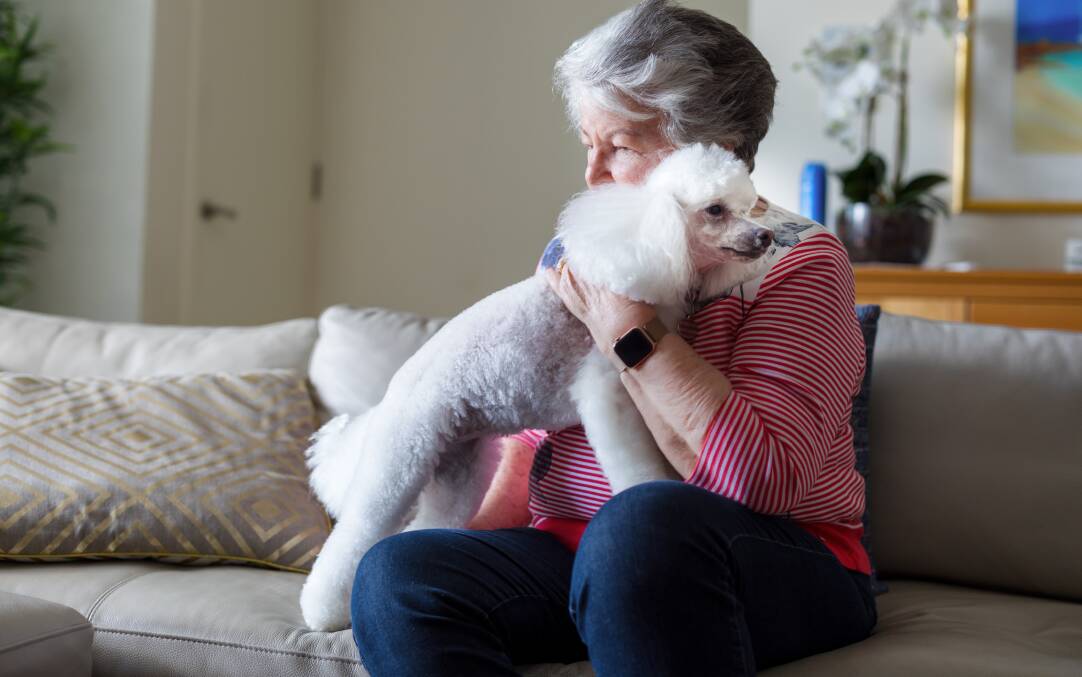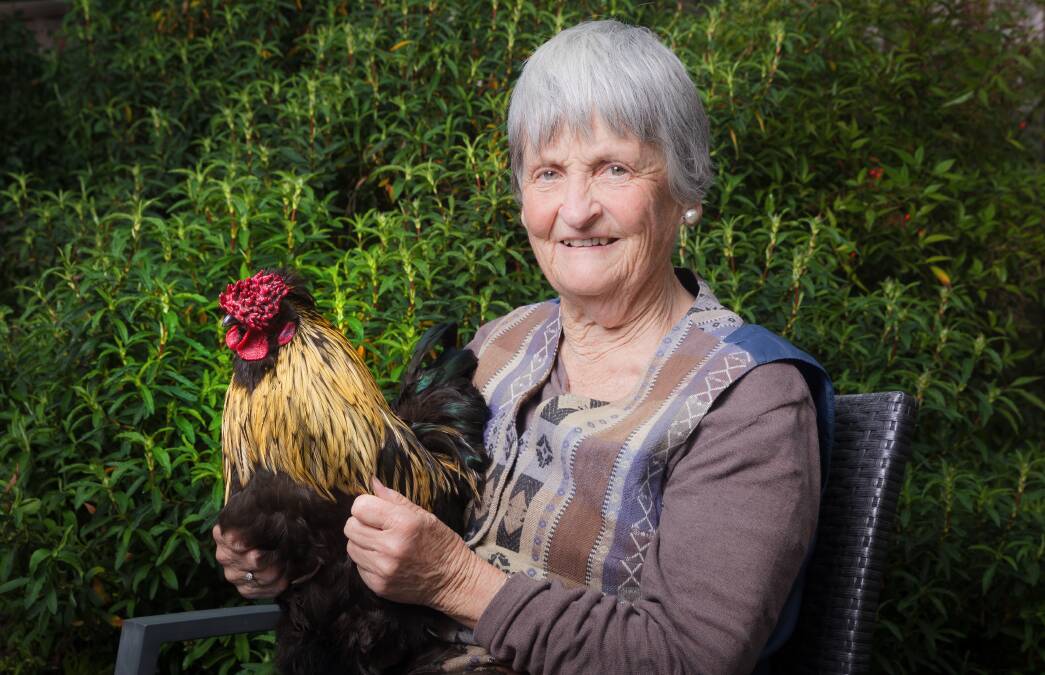
The United Nations International Day of Older Persons is marked on Saturday, October 1 at a time when, globally, the population aged 65 and over is growing faster than all other age groups.
According to data from World Population Prospects: the 2019 Revision, by 2050, one in six people in the world will be over age 65 (16 per cent), up from one in 11 in 2019 (9 per cent). The number of persons aged 80 years or over is projected to triple, from 143 million in 2019 to 426 million in 2050.
The theme of the day this year was "Resilience of Older Persons in a Changing World".
And older Canberrans have revealed that having a much-loved pet is as essential to being resilient as anything else. They say animals keep them interested in life. Two of the three older Canberrans we spoke to are still living in their own homes; the other lives in a retirement village which is pet-friendly.
Canberra-based volunteer community organisation Pets and Positive Ageing is committed to supporting ageing pet owners and helping them to keep their pets for as long as possible. Their latest campaign is to ensure older pet owners, who are also aged-care package recipients, have in-home pet support included in their updated packages, starting in 2024. The federal government is set to reform in-home aged care by July 1, 2024. Support included in the packages could include the cost of dog-walking or grooming, vaccinations or emergency boarding.
Pets and Positive Ageing says 69 per cent of Australians own a pet and ensuring they can keep them into old age makes a difference to their quality of life, not least providing a constant companion and easing loneliness.
And in-home pet support could keep to keep the owner and pet together for longer, the group maintains.
"As pet owners age and have medical crises they may need pet support for periods of time in the home. This support can be far more important to a pet owner than accessing some other available services, such as, for example, gardening," Pets and Positive Ageing says.
"Pets also help keep people in the community longer and out of residential care, which is what governments want to encourage."
Pets and Positive Ageing is passionate about more help for older pet owners.
"With this support, older pet owners can continue living with loved companion animals," the group says.
"It helps prevent pets being surrendered, sent to overcrowded shelters or euthunised with all the trauma that brings to the animal and the older person.
"Pet support helps owners to avoid falls and injury while trying to care for their pets. There will be fewer emergency service call outs and hospital care, with a consequent benefit to owner health and a saving to governments.
"With rising loneliness among older Australians, daily companionship in their own home from a beloved animal companion is very effective social support. By contrast to the cost of paid visitors, an owner's pet provides 24 hour and inexpensive (to government) social support."
Ric Longmore and his snake Precious
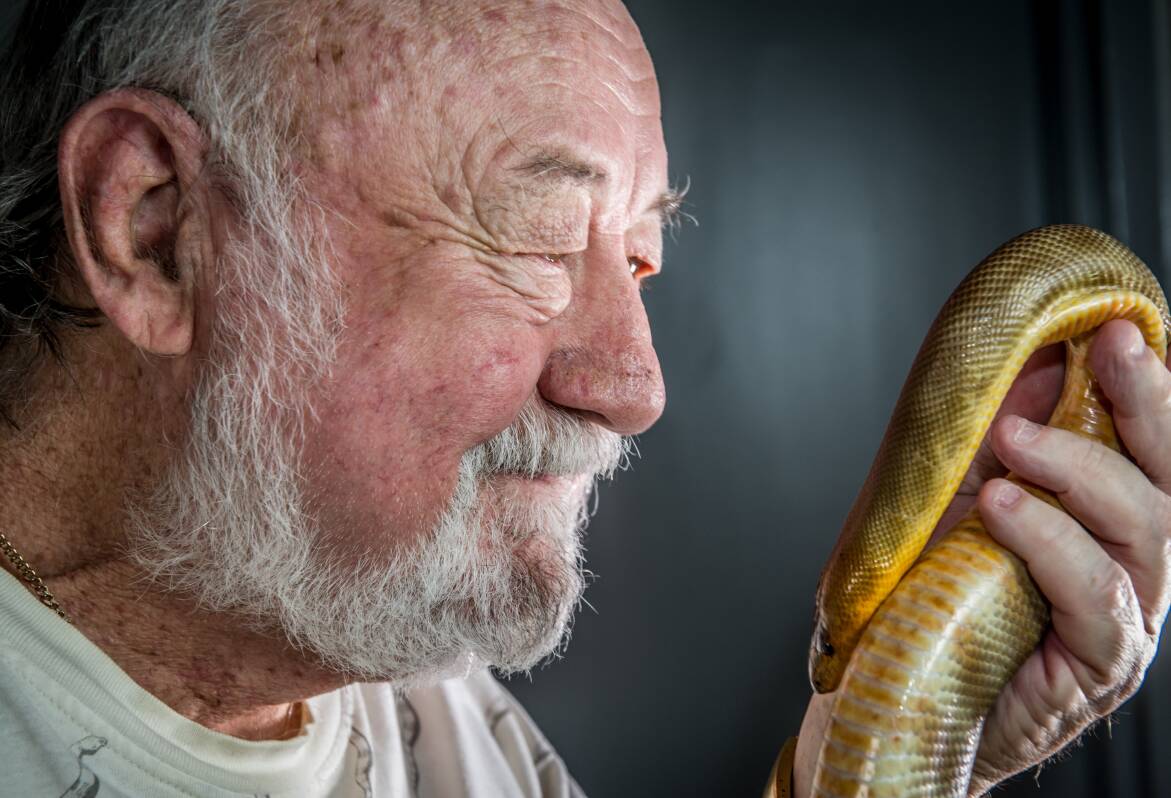
Belconnen's Ric Longmore has owned Precious, the woma or sand python, since she hatched from an egg 16 years ago.
Precious is tucked away in a heated cage in his garage, taken out every now and again to spend time with Ric in his Hawker unit. She's also the star of the annual Snakes Alive! display at the Australia National Botanic Gardens which Ric instigated "about the same time as Floriade started".
"She's a particularly good display animal, she's good with kids, she's easily hand-able," Ric says.
"A lot of snakes will get snappy and bite. You've got to know how to handle snakes and I know she's very good. I would never risk a snake with a child if I thought it was a bit cantankerous."
The retired biologist and life member of the ACT Herpetological Society has had a lifelong fascination of snakes.
"I've been involved with snakes since I was 10 and I'm 74 now," he says.
"My first pets were lizards. I'd go out with Dad, he'd be collecting firewood and I was collecting lizards. This was the 1950s."
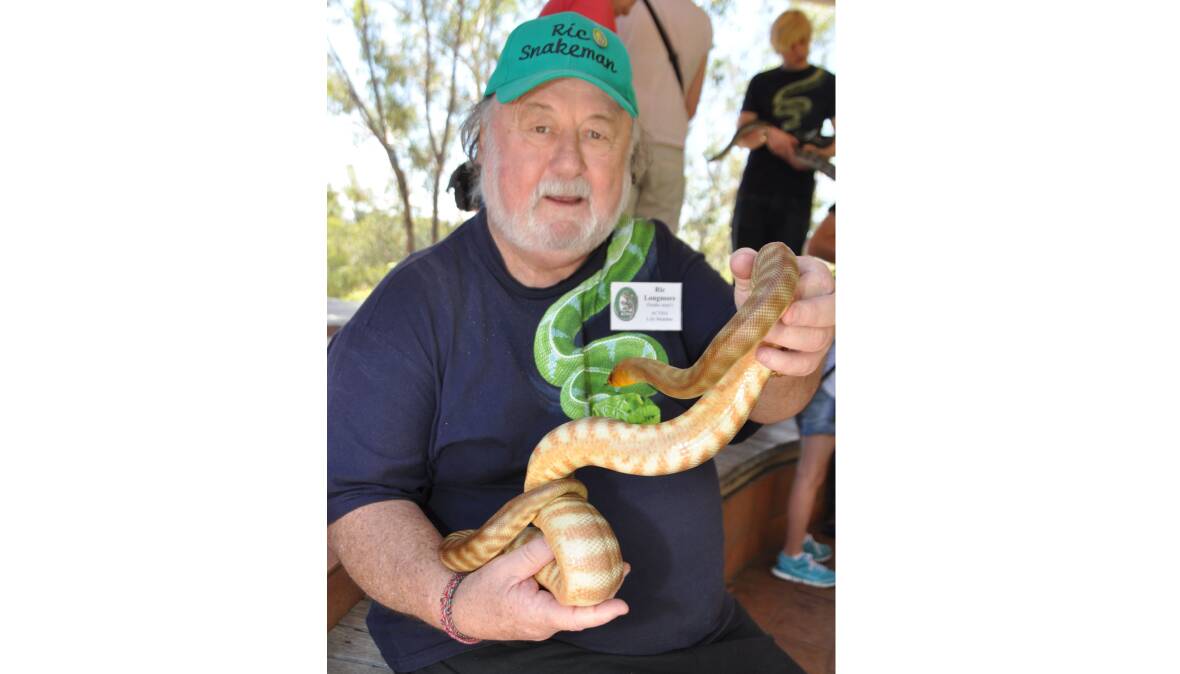
Ric studied science at the Australian National University and worked as a biologist for the government for more than 30 years.
"I didn't work on snakes at work, I worked on kangaroos and water fowl. But at least I had a job which was involved with my expertise, which was zoology," he says.
Ric's passion for snakes never waned and he eventually became a snake collector in the ACT, called upon to come get a snake from someone's backyard or garage, which he did for free.
When he was working at the Bureau of Flora and Fauna, he used to have a sign saying "Ric is on a snake call" to put outside his office, every time he was asked to come retrieve a wayward reptile.
Ric received the Medal of the Order of Australia in 2013 for service to herpetology, particularly the study of snakes and lizards.
"It was a wonderful day and I felt so proud," he says.
An only child and divorcee, with one daughter living in Brisbane, Ric shares a special companionship with Precious, enjoying seeing her thrive in his care.
"She's very inquisitive. She's a beaut snake. She brings me ultimate joy," he says.
"When she feeds when she sheds her skin, when she comes up to the glass and sticks her tongue out. I know that means, 'I'm hungry, boss'. Little things you pick up from snakes over many years of studying, of watching."
Ric, who suffered a heart attack at Christmas, is determined to stay well enough to live in his own home. His interest in snakes and the wider herpetological community keeps him vital. He despairs when children spend a lot of money to get a pet reptile but lose interest in them later in life.
"It's a love for life," he says. "And my love has never waned.
Di Nickalls and her chooks
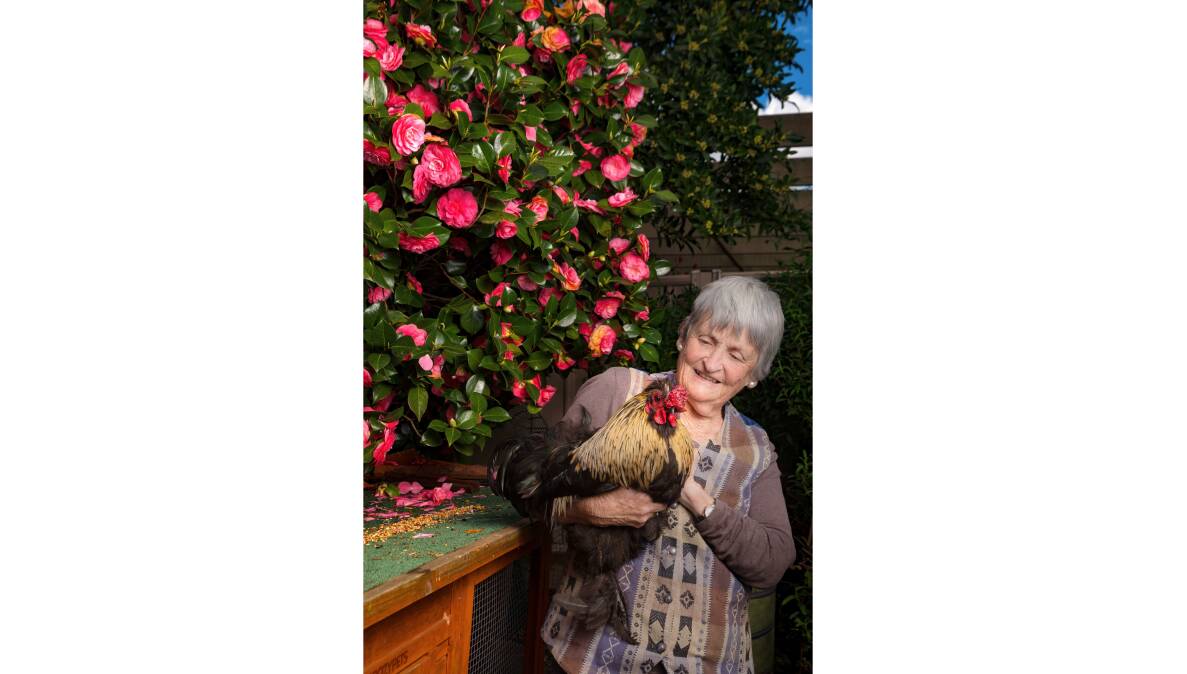
In the middle of Canberra suburbia, four chooks are pecking around the sunny courtyard of Di Nickalls.
The retired mothercraft nurse lives in Brindabella Court retirement village, which is run by Anglicare and among several pet-friendly aged-care facilities in Canberra.
Born and bred in Canberra, Di started life with her family in the Westlake workers' camp before they moved to Barton.
The oldest of six kids, Di remembers the family had chickens at the family home in Young Street.
The used to walk down the street to school at Telopea Park School, close enough to walk home for lunch, the chickens scratching around the garden, waiting for them.
The 75-year-old grandmother has been in the village for eight years after raising her family and working as a mothercraft nurse, including at the Queen Elizabeth II Family Centre.
"The two things I wanted when I retired were my own chickens and a wood fire. I've got the chickens, still working on the fire," she says, with a laugh.
While the chickens are relaxing and provide at least an egg a day, Di always held on to the hope of having her own from "another, earlier life".
Her now ex-husband was a chicken farm supervisor in the Hunter Valley years ago when everything was about the birds being caged, over-crowded and high-producing.
"It really upset me so I always had in the back of my mind that I wanted to have my own chickens," she says.
And give them the good life. Which her two handsome roosters and two pretty hens have in spades, being able to roam around the courtyard, scratch in the earth and under the leaves and stretch their legs in the sun.
Roosters are allowed in suburban areas in the ACT and Di takes extra precautions to avoid them upsetting her neighbours with any crowing by keeping them in a safe, dark space until the sun is well and truly up.
Her chickens are simply part of her life, a gentle life of gardening and family and watching the birds peck at the lawn.
"It's really relaxing watching them," she says.
"And when you get home after being out, they run to the back door to see what you've got for them. They do get used to you."
Bev Nicholson and her poodle Pebbles
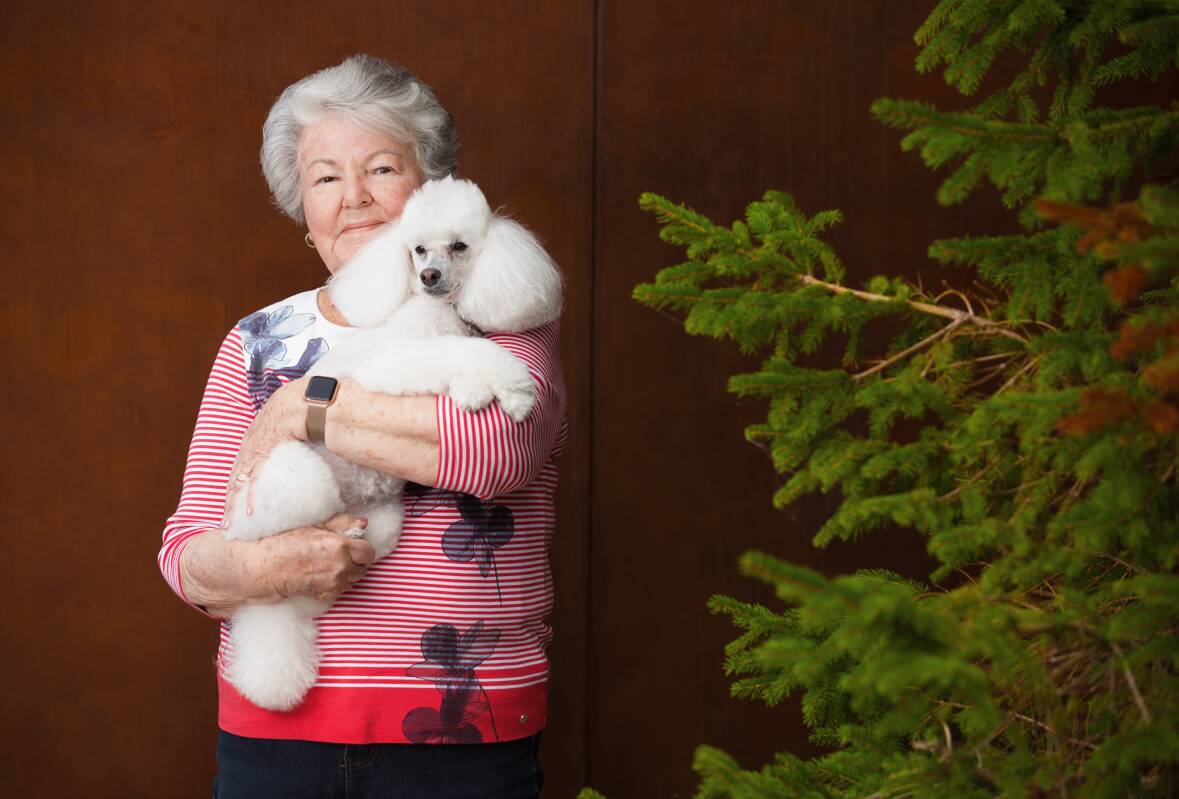
Tuggeranong grandmother Bev Nicholson is a true dog person.
She's had five dogs over her lifetime, and each one has been an important part of the family. There's no disputing they are much more than animals.
The dogs provide entertainment, fun, companionship, and a sense of social connection.
Bev, 77, and her most recent dog Pebbles, the toy poodle, live in a townhouse in Greenway.
"My neighbours adore her," Bev says.
"And other people in the complex don't know me, but they all know my dog."
Pebbles has been in her life for eight years.
"I'd be quite lost if I didn't have her," Bev says.
"I talk to her and take her everywhere with me and she follows me around the house. Living alone, I think everyone needs a dog. Or a pet of some kind."
Her dog before Pebbles was Mikito, a Shih Tzu. When Bev's daughter Lisa got married, Mikito, and Lisa's chihuahua, Truffy, wore tuxedos.
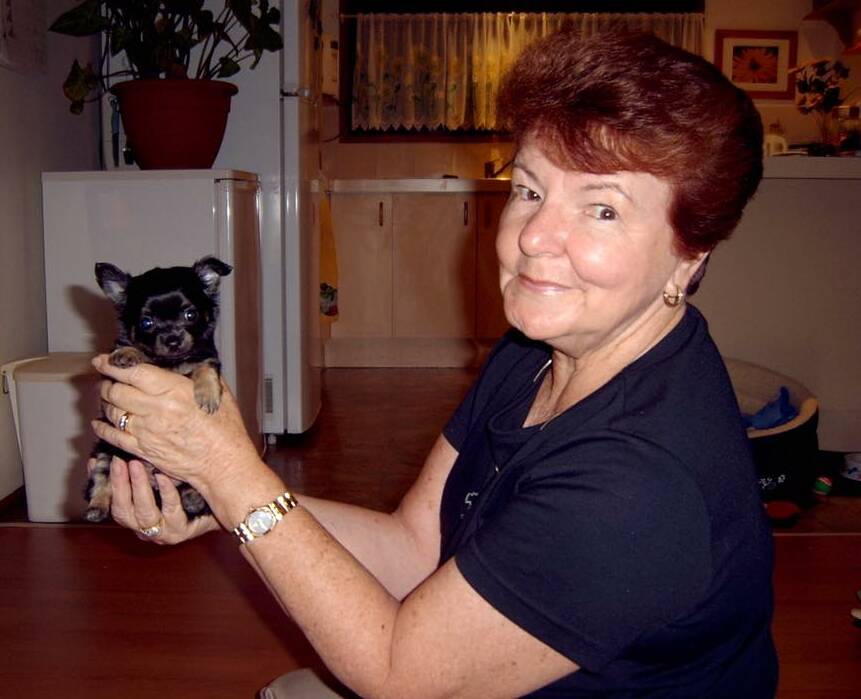
Mikito was special because Beb bought him with her husband John.
"He was only seven months old when John died, he was just a little puppy. And he graduated very quickly from a play pen in the family room to the dog pen in my room and then on to my bed," Bev says, with a laugh.
Mikito was a great solace to Bev when she lost her husband in 2003. He had terminal cancer but suffered a sudden heart attack following chemotherapy.
"John died at home so I sat there with paramedics and police and everything and sat there with Mikito on my lap," she says.
Having Pebbles now keeps her active too, especially after a knee replacement.
"Many a time I've been stiff and sore and not wanting to walk but I feel obliged to at least walk her around the block," she says.
